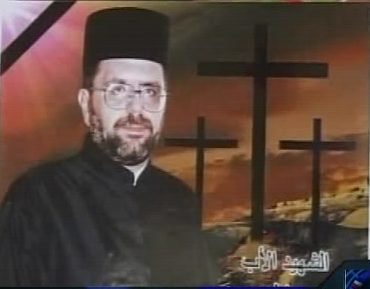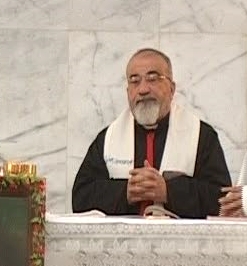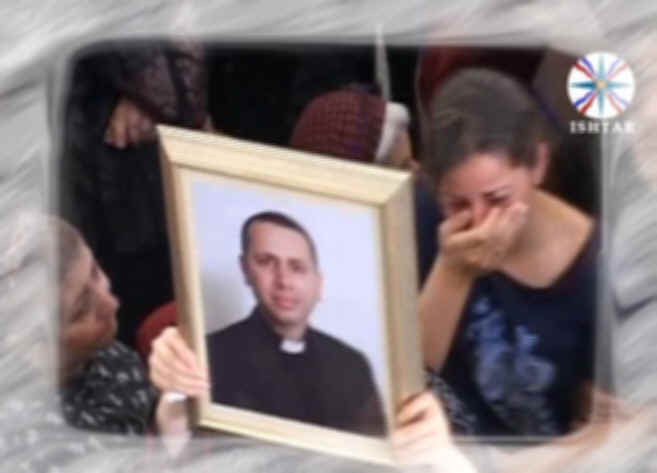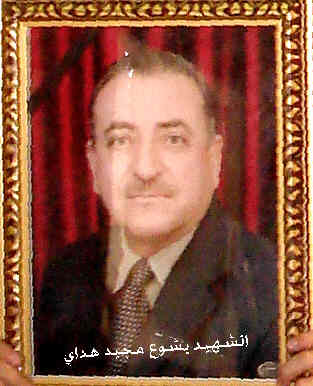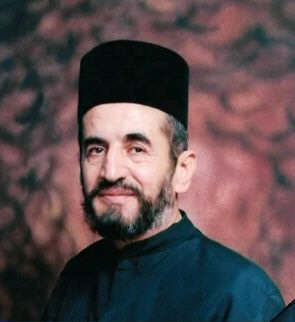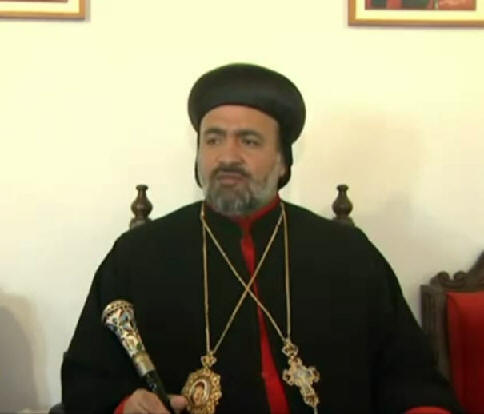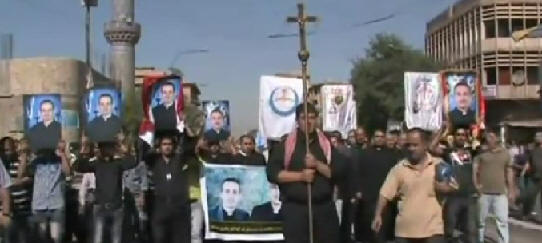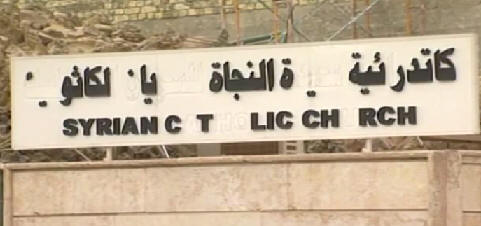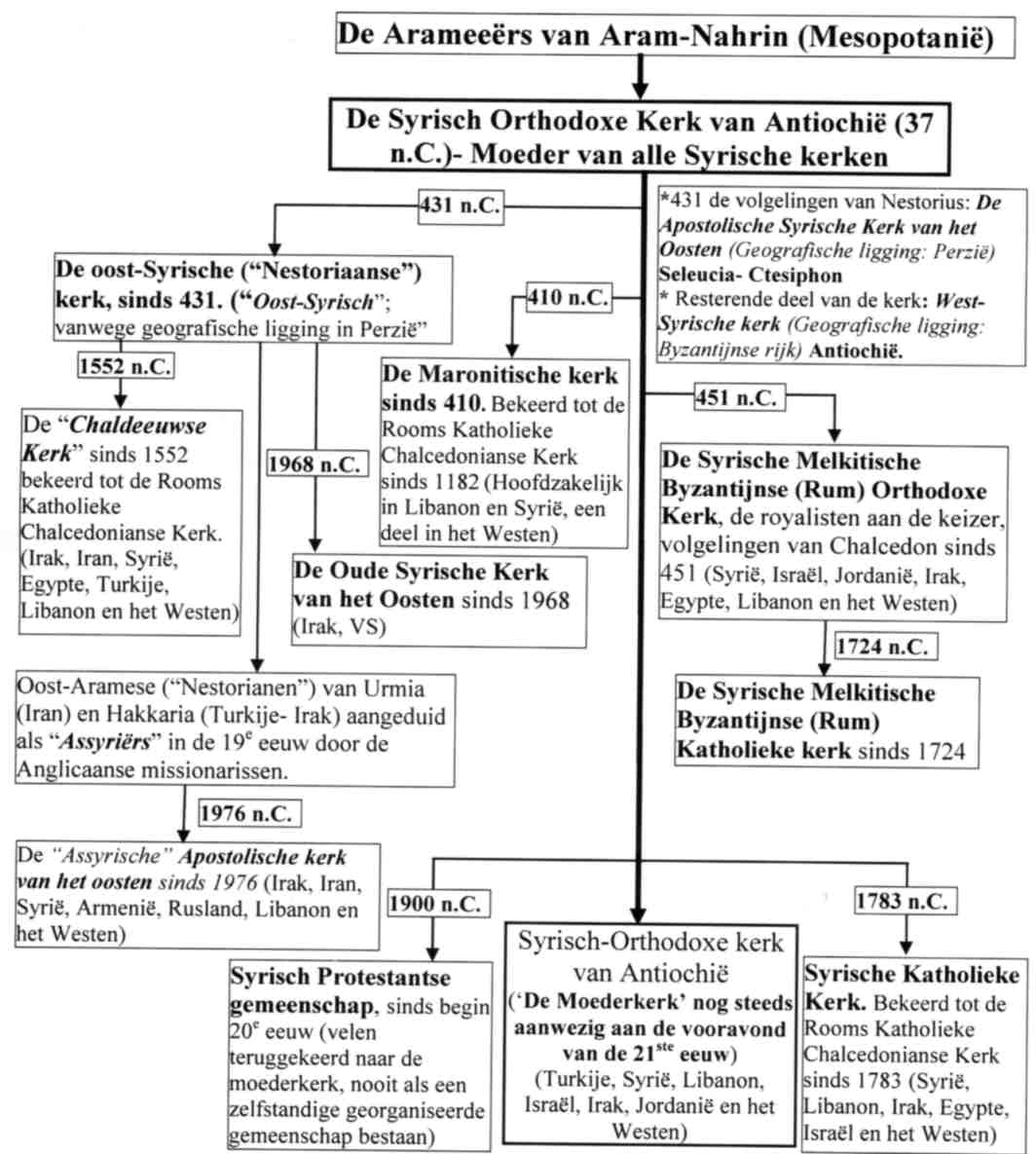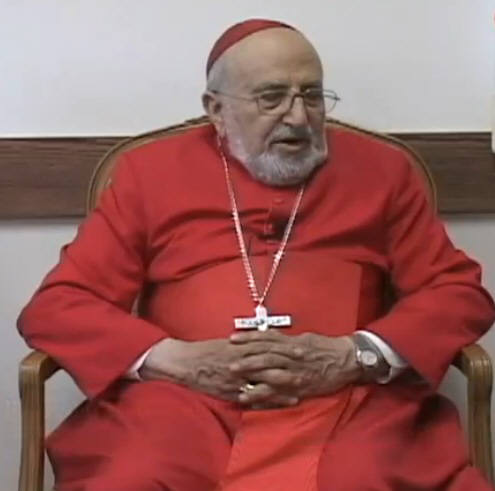|
12-1-2013: Irak: Aramese lerares en student vermoord in Mosul
18-8-2011: Irak en de Arameeërs: Het gebruikelijke ritueel, opblazen van hun kerken
17-5-2011: De Oost- Aramese Chaldese Yacob Issa in Kirkuk, noorden van Irak, afgeslacht
22-11-2010: Het Aramese bloed blijft vloeien in Irak: Twee Aramese broers gedood in Mosul
11-11-2010: Een dramatische oproep van een Aramese geestelijke leider: Verlaat Irak
1-11-2010: Bloedbad onder de Arameeërs van Bagdad: Zoiets als dit heeft nooit plaatsgevonden hier
11-6-2010: Een VN bijeenkomst in het Noorden van Irak over de veiligheidssituatie
14-5-2010: Irak: De 19 jarige Aramese meisje Sandy Shabib Hadi Zahra overlijdt aan haar verwondingen
10-3-2010: Exodus Arameeërs uit Mosul: Volgens recent VN rapport hebben meer dan 5000 Arameeërs Mosul verlaten.
27-2-2010: De Raad van Kerken in Irak doet een beroep op de overheid om de Aramese bevolking in Mosul te helpen
26-2-2010: De Arameeërs van Mosul: Een nieuwe Exodus en Etnische zuivering aan de gang
18-2-2010: De Arameeërs van Irak zijn weer het slachtoffer van moorden en bloedbaden
6-1-2010: Autobom ontploft in het Aramese dorp Bartalla in Irak
24-12-2009: Een kerst "boodschap" voor de Arameeërs in Mosul: Vier Aramese kerken aangevallen en één Arameeër gedood
1-9-2009: Arameeërs van Irak: De Oost- Aramese Chaldese bisschop Louis Sako van Kirkuk luidt de noodklok
13-7-2009: Zeven Aramese Kerken in Bagdad (Irak) door extremisten aangevallen met autobommen
4-5-2009: Aramese bloed blijft vloeien in Irak....
15-11-2008: Irak: Het bloedvergieten van het Aramese volk en bombarderen van de kerken gaat onverminderd door
2-9-2008: Weer twee Arameeërs gedood in Irak
5-4-2008: West- Aramese Syrisch Orthodoxe priester Yusuf Adel Abudi in Bagdad op 5-4-2008
Zondag 6-4-2008: Begrafenis West- Aramese Syrisch Orthodoxe Priester Yusuf Adel Abudi
9-4-2008: Door alle ellende heen: Wonderen gebeuren in Irak
De moord op Mgr. Faraj Rahho
1-3-2008: Oost- Aramese Chaldese bisschop in Mosul, Irak ontvoert. Drie van zijn lijfwachten vermoord
13-3-2008: Zijn lichaam werd gevonden op 13-3-2008 in Mosul
14-3-2008: Op 14-3-2008 werd hij begraven in St. Addai Kerk in Karemlesh
7-1-2008: Aanslagen op de Aramese Kerken en instellingen in Irak
22-11-2006: De West- Arameeër Isoh Majeed Hadaya vermoord door terroristen in Irak
12-10-2006: Aramese priester in Mosul (Irak) onthoofd
16-3-2005: Oost- Aramese ,,Nestoriaanse” generaal Waed Yussuf Yacoub gedood
17-1-2005: West-Aramese (Syrisch Katholieke) Aartsbisschop van Mosul ontvoerd
|
Het Aramese volk: Het Aramese volk (niet te verwarren met 'Armeniërs') spreekt Aramees, de taal van Abraham, Mozes en Jezus Christus. Zij zijn het inheemse volk van wat in vroegere tijden 'Aram-Nahrin' werd genoemd en in onze dagen bekend is geworden onder de naam 'Mesopotamië' Sommige Arameeërs noemen zich in onze dagen "Assyriërs", dit vanwege de haatzaaiende geestelijke koloniale activiteiten van de Westerse missionarissen en diplomaten in het Midden-Oosten in de 16e en 19e eeuw. Andere Arameeërs zijn bekend geworden als "Chaldeeërs". Ze zijn echter allemaal Arameeërs. Overal waar U het woord "Assyriërs" tegenkomt dient U het als Arameeërs te lezen.
Een dramatische oproep van een Aramese geestelijke leider: Verlaat Irak. Opnieuw een aanslag op de Aramese Christenen van Irak.
Bisschop Touma Davud van de Syrisch Orthodoxe Kerk in Verenigde Koninkrijk (Londen)
De situatie voor de Arameeërs van Mesopotamië in Irak is zodanig aan het verslechteren dat de Aramese bisschop Touma Davud uit Verenigde Koninkrijk op 7-11-2010 de kwestie op een dramatische wijze samenvatte “ Ik wil graag dat ons volk Irak verlaat, omdat er geen bescherming is, geen steun, mensen worden vermoord, waarom leven wij in ons land en worden wij vermoord?” (http://english.aljazeera.net/video/europe/2010/11/2010117192021317580.html) http://www.bbc.co.uk/news/uk-11705032 http://edition.cnn.com/2010/WORLD/meast/11/07/uk.archbishop.iraq/
De dramatische uitspraak van bisschop Davud volgde op de bestorming van de Aramese Katholieke kerk in Bagdad op 31-10-2010 door terroristen waarbij 52 Aramese mannen, vrouwen en kinderen om het leven kwamen. Onder de slachtoffers waren twee Aramese priesters.
Dergelijke oproepen spelen echter de terroristen in Irak in de kaart. Het geeft een verkeerd signaal af, waardoor ze moorden en terreur als beloning kunnen gaan beschouwen. Niet alleen de Arameeërs, maar ook andere groepen in Irak hebben te lijden van terreuraanslagen en bloedbaden. Toch adviseren de leiders hun volk niet om Irak te verlaten. Zulke uitspraken werken ook demotiverend en wekken apathie op! De taak van geestelijken als bisschop Davud is om juist het volk een hart onder de riem te steken en hen aanmoedigen om in Irak te blijven om daarmee het christelijke fakkel van licht in deze donkere tijden te blijven branden in een land waar kwade machten vrije speel lijken te hebben.
Datgene wat zich nu afspeelt in
Irak is al veel langer aan de gang in Egypte. De kopten in Egypte worden
sinds honderden jaren vermoord, vervolgd, gediscrimineerd en geterroriseerd
door afschuwelijke machten van afgrond die nooit van vrede en liefde hebben
gehoord. Toch adviseren de Koptisch leiders hun volk niet om het land te
verlaten. In tegendeel, het lijden van de Christenen wordt door de Koptische
geestelijke leiders beschouwd als “het kruis” die een ware Christen dient te
dragen. De lijfspreuk van de charismatische Patriarch Snouda is daarom: “God is erbij”. Daarmee wil hij benadrukken dat je als Christen onder de meeste barre omstandigheden volledig op God moet vertrouwen, omdat “God alles Ziet”, inclusief verkrachtingen, moorden, in brand steken van de kerken en ondragelijke discriminatie en lijden in Egypte. Het resultaat hiervan is dat de Here God inderdaad wonderen verricht in Egypte. Je hoort geregeld dat de meest bloeddorstige Islamitische geestelijke leiders, die als het mogelijk zou zijn de Christenen zouden willen vernietigen, door Jezus Christus worden bezocht en zich bekeren tot het Christendom. Bisschop Touma Davud dient het voorbeeld van de Koptische geestelijke leiders te volgen en het volk aan moedigen om in Irak te blijven en als zout te fungeren in deze zware tijden. Hij dient het voorbeeld van de Aramese patriarch Ignatios Nurono (de eerste Patriarch na Petrus) te volgen die in alle nederigheid zijn lot aanvaarde en naar Rome werd gebracht om vervolgens voor de leeuwen te worden gegooid voor de zaak van Christus. Het is niet voor niets dat de Bijbel zegt:
Bisschop Touma Davud dient juist nadruk te leven dat het “lijden” een deel is van het leven van de Christenen. En daarom dat de Aramese Christenen zich niet uit het veld moeten laten slaan door de krachten die proberen hen het land uit te jagen. In tegendeel, bisschop Davud moet het volk in Diaspora en in Irak oproepen tot een vastenperiode om zich voor de Here God te vernederen om zo de krachten van de Satan te kunnen weerstaan, omdat wij lezen in de Bijbel, “Roep de mensen op tot vasten! Roep ze bijeen! Laat iedereen naar de tempel komen: leiders en volk……. Ga naar het huis van de Heer, jullie God, en schreeuw je ellende voor hem uit “ (Joel 1:14) …..Blaas op de hoorn in Sion. Roep de mensen op tot vasten, roep ze bijeen! 16 Laat het volk samenkomen, laat iedereen naar de tempel komen, jong en oud, ook de allerkleinsten; zelfs bruidegom en bruid: zelfs zij moeten komen (Joel 1:15-16)
Hoe meer lijden, hoe meer vasten en meer verootmoediging voor de Here God, dat dient de boodschap te zijn van bisschop Davud in navolging van de Koptische leiders in Egypte.
Door een oproep te doen om Irak te verlaten, raakt het volk ontmoedigt en krijgt de Satan zijn zin. Dat is een foute gedachte. Wat zal het volk ermee winnen om naar het “luxueuze” Westen te komen? Niets. Behalve dat zij zichzelf en hun kinderen zullen verliezen.
De Irakese premier Nouri Al- Maliki heeft op dinsdag 10-11-2010 opgroepen om Christenen niet aan te moedigen Irak te verlaten. Dit naar aanleiding van het verlenen van asiel door Frankrijk en andere landen.
Nieuw aanslag: 5 doden en 20 gewonden
De tranen van de moorden op 31 oktober 2010 waren nog niet gedroogd of the terroristen sloegen op woensdag 9-11-2010 weer toe. Ze vielen de Aramese Christelijke huizen in Bagdad aan met raketten en mortiergranaten waarbij 5 mensen werden gedood en 20 raakten gewond. De terroristen lijken hun dreigementen waar te maken, “All Christian centers, organizations and institutions, leaders and followers, are legitimate targets for the mujahideen [holy warriors]”
Volgens een Aramese geestelijke in Bagdad, die wij telefonisch spraken , heerst er chaos door het ontbreken van een adequate opererende politieapparaat. Er vinden daarom dagelijks moordpartijen plaats. Het is niet meer bij te houden hoeveel mensen per dag worden vermoord in Bagdad en andere steden.
Dit werd ook op een duidelijke wijze onder woorden gebracht door een Sjitische winkelier in de nabijheid van de op 31 oktober 2010 aangevallen Aramese Katholieke kerk, “Wij weten dat er een controlepost of een politieauto voor de ingang van elk kerk is gestationeerd. Welnu, hoe zijn de gewapende mannen de kerk binnengekomen? Waren er gevechten voorheen? We hoorden niet van gevechten, dat betekent dat de gewapende mannen heel makkelijk de kerk zijn binnengedrongen. Opnieuw zeg ik, hoe heeft dit plaatsgevonden, vooral in Karrada, die nu bijna op een militaire kamp lijkt?”
**************************************************************************************
=======Arameeërs van Irak======
Voor de oorlog van 2003 waren er rond 800.000 Arameeërs in Irak. Vermoedt wordt dat er meer dan de helft Irak heeft verlaten. De aanslagen op hun kerken en leiders hebben het Aramese volk het land uitgejaagd. We noemen paar voorbeelden:
In Irak zijn de volgende Aramese denominaties
De termen “Oost-“ en “West- Arameeërs” gaan terug tot de tijd van het vroegere christendom waar de Aramese inheemse natie geografisch werd aangeduid zulks. Ruwweg vormde de Rivier de Eufraat de grens. Diegenen die ten oosten van Eufraat woonden, dus in Perzië, werden aangeduid als “Oost- Arameeërs” en diegenen die ten Westen van Eufraat woonden, dus in het Romeinse Rijk, werden genoemd de “West- Arameeërs”. De aanduiding “Chaldeeërs” en “Assyriërs” voor de Oosterse Arameeërs gaat terug naar de Westerse Koloniale activiteiten in de 16e eeuw (Frankrijk + Katholieke missionarissen) en 19e eeuw (Groot-Brittannië + Anglicaanse missionarissen). De kerkelijke en politieke Westerse machten werkten nauw samen met elkaar en hebben kampen opgezet in Turkije, Irak en Iran waar de Aramese kinderen werden “opgevoed” waardoor zij compleet werden ontworteld van hun Aramese oorsprong. Ze plantten daarbij een afschuwelijke vorm van fanatisme in hun harten dat voor een immense afkeer zorgde van hun Aramese oorsprong.
In het jaar 1553 hersenspoelden de Westerse Katholieke missionarissen, samen met Frankrijk een deel van de Oost- Aramese geestelijken, doormiddel van omkoping en chantage om zichzelf “Chaldeeërs” te noemen met het resultaat dat de Aramese taal bekend raakte als “Chaldese’ taal en een deel van de Aramese natie bekend raakte als “Chaldese” natie in sommige delen van de Westerse literatuur, de eerste aanval op de Aramese erfgoed.
Vanwege de onderlinge haat en competitie tussen de Westerse Katholieken en Protestanten, werd hetzelfde proces herhaald in de late 19e eeuw, dit maal door de Anglicaanse missionarissen en Groot-Brittannië, en het andere deel van de Oost- Aramese “Nestoriaanse” stammen van Hakkaria (grens Turkije en Irak) en Urmia (Iran) om zichzelf “Assyriërs” te noemen- een term dat (toen) werd gebruikt puur geografisch en alleen toegepast op de “Nestorianen”. Het resultaat was dat het Aramees bekend raakte als “Assyrische” taal en de Aramese natie als “Assyrische” natie- dit was de tweede en meer ernstige aanval op de Aramese erfgoed – een soort geestelijke genocide
Aanverwante artikelen Arameeërs Irak: http://www.iraqichristians.org/Dutch/Arameeers_Irak_Aanval_Kerk_1_11_2010.htm http://www.iraqichristians.info/Dutch/Arameeers_Irak_Sandy_Shabib_Hadi_Zahra_14_5_2010.htm http://www.iraqichristians.info/Dutch/Arameeers_Mosul_Moorden_NieuwExodus_26_2_2010.htm http://www.iraqichristians.info/Dutch/Arameeers-Mosul_Vermoord_18_2_2010.htm http://www.iraqichristians.info/Dutch/President_Irak_Oproep_VN_26_10_2009.htm http://www.iraqichristians.info/Dutch/Groot-Israel-Arameeers_Irak_EtnischZuivering_28_8_2009.htm http://www.iraqichristians.info/Dutch/Aramese_Kerken_Bagdad_Bomaanslag_13_7_2009.htm http://www.iraqichristians.org/Dutch/Aramese_Bloed_BlijftVloeien_In_Irak_4_5_2009.htm http://www.aramnahrin.org/Dutch/Arameers_Eenheid_Kolonialisme_5_10_2009.htm http://www.iraqichristians.org/Dutch/Aanslagen_ArameseKerken_Irak_7_1_2008.htm http://www.iraqichristians.org/Dutch/Mosul_Aramese_Srebrinica_24_10_2008.htm http://www.iraqichristians.org/Dutch/Wonderen_In_Irak_9_4_2008.htm http://www.aramnahrin.org/Dutch/Arameeers_Vermoord_Mosul_2_9_2008.htm http://www.aramnahrin.org/Dutch/Arameeers_Irak_moord_Mosul_Qaraqosh_15_11_2008.htm http://www.iraqichristians.org/Dutch/ArameseOrganisaties_Verzoek_VN_Irak_31_10_2008.htm http://www.iraqichristians.org/Dutch/Moorden_Etnische_Zuivering_Arameeers_Irak_13_10_2008.htm
http://www.aramnahrin.org/Dutch/ExpertMechanism_2009.htm http://www.aramnahrin.org/Dutch/Arameeers_In_De_Media_Desinformatie.htm http://www.aramnahrin.org/Dutch/Aramese_Geestelijke_genocide.htm
**********Articles in the media*************
Iraq's Christians terrorized by wave of bombings Nov 10, 3:52 PM (ET) By BARBARA SURK and HAMID AHMED
BAGHDAD (AP) - Suspected Sunni militants took aim again at Baghdad's dwindling Christian community, setting off a dozen roadside bombs Wednesday and sending terrified families into hiding behind a church where walls are still stained from blood from an attack nearly two weeks ago.
Five people were killed and 20 were wounded in the bombings and mortar attacks that targeted Christians across the city, police and hospital officials said. Iraqi Christians are already reeling after the earlier attack on a Sunday Mass service left 68 people dead, and many are now wondering whether it's time to leave their homeland.
At a house on the grounds of Our Lady of Salvation Church, Karim Patros Thomas was under no illusion that the community is under siege.
On Oct. 31, Thomas' brother-in-law bled to death on the church floor after militants stormed the building, shot congregants in the first row, held others hostage and then set off bombs when Iraqi forces came to the rescue. Then Wednesday morning, two bombs went off in quick succession outside his home.
"We are terrified," Thomas said, who sought refuge with his family Wednesday at the church. "I cannot go back to my house. They will attack again. They want to kill us."
A priest at the church, Moukhlis Shash, said four families arrived Wednesday, and he expects more in the coming days. He said some of the families found on their doorsteps a bullet wrapped in paper that read: "Your blood is legitimate for us."
Security was beefed up around churches in Baghdad after the church massacre, possibly pushing the militants to target the homes as easier targets.
Several police vehicles, equipped with machine guns, surrounded the church Wednesday. The building's outside walls were still riddled with bullets. Pictures of two priests, killed in the siege, hung above the main entrance. Pieces of black cloth, each adored with a white crucifix, were tied to the metal fence surrounding the church.
Police said at least 11 roadside bombs went off within an hour Wednesday in three predominantly Christian areas of central Baghdad. Two mortar rounds also struck Christian enclaves of the predominantly Sunni neighborhood of Dora in south Baghdad. Two bombs planted in deserted Christian homes in western Baghdad destroyed two houses.
The night before, a series of bombs hit three empty houses belonging to Christians but no one was hurt.
"It's not worth staying in a country where the government is not able to protect you even when you are sitting in your house," said Juliet Hana, a 33-year-old Christian who lives in one of the neighborhoods targeted Wednesday. She was having breakfast with her daughter when she heard the bombs go off, and said she plans to leave soon for either Syria or Jordan.
Catholic officials estimate that more than 1 million Christians have fled Iraq since the U.S.-led invasion in 2003. Many went to Syria, which in recent days has seen a greater number of arriving Iraqis than usual.
Sargon Dawod, director of the Assyrian General Conference in Damascus said eight families - 30 people - have immigrated to Syria over the past 10 days. He expects that number to increase.
Fadel Mikha Sam'an, 66, said he went to Syria four days ago after losing three relatives in the church attack.
" The terrorists are killing Christians. They want to empty Iraq of Christians," he said.
Sunni militants such as al-Qaida justify their attacks by questioning whether the Christians are loyal to countries in the West rather than to Iraq. A group linked to al-Qaida in Iraq has claimed responsibility for the attack on the church.
Iraq's top Catholic prelate, Chaldean Cardinal Emmanuel III Delly, has encouraged the remaining 1.5 million Christians to stay in the country and asked authorities for more protection.
At the Baghdad church, Thomas said the Christians have no tribal leaders or militias to protect them. He is begging his wife to leave the country with their children.
His wife, Selma Edward Eskander, said she considers Iraq's Muslims her family too.
"I don't want to leave. I just want to be somewhere where my children are safe," she said, still dressed in black to mourn her older brother. "I wonder what has happened to Iraq. We Christians and Muslims used to live together." --- Associated Press writer Sameer N. Yacoub in Amman, Jordan, and Albert Aji in Damascus, Syria contributed to this report.
3 killed, 26 hurt as Iraqi Christians attacked November 10, 2010 - 6:34PM
A spate of early morning bomb and mortar attacks on homes of Christians in Baghdad Wednesday left at least three people dead and 26 wounded, an interior ministry official said.
"Two mortar shells and 10 homemade bombs targeted the homes of Christians in different neighbourhoods of Baghdad between 6:00 am and 8:00 am (0300 and 0500 GMT)," the official said, speaking on condition of anonymity.
"The toll is three dead and 26 wounded."
The attacks come 10 days after 44 Christian worshippers, two priests and seven security forces personnel died during the seizure of a Baghdad cathedral by Islamist militants and the ensuing shootout when it was stormed by troops.
On Tuesday, three homes in the Mansur district of western Baghdad belonging to Christians were firebombed without causing any casualties, an interior ministry source said.
On November 3, Al-Qaeda claimed responsibility for the Baghdad cathedral bloodbath and warned it would further step up attacks on Christians.
The extremists said they had carried out the church attack to force the release of converts to Islam allegedly being detained by the Coptic Church in Egypt. Days afterwards it declared Christians everywhere "legitimate targets."
A senior Iraqi clergyman said at the weekend Iraq's Christians should leave the country or face being killed at the hands of Al-Qaeda. "If they stay they will be finished, one by one," Archbishop Athanasios Dawood told the BBC.
Iraq's premier however on Tuesday cautioned other countries not to encourage Christians to abandon their homeland, after France took in dozens of people wounded in the October 31 cathedral attack.
On his first visit to the church targeted on October 31, Prime Minister Nuri al-Maliki said that at a meeting with Pope Benedict XVI in 2008 he had asked the pontiff "not to let the east be emptied of Christians, nor the West of Muslims."
"The countries that have welcomed the victims ... of this attack (on the church) have done a noble thing, but that should not encourage emigration," he said on a visit to the Syriac Catholic cathedral where the massacre occurred.
Thirty-four Iraqi Christians and a Muslim guard wounded in the incident flew in to France on Monday for admission to hospitals for treatment.
French Immigration Minister Eric Besson has said this fitted France's "tradition of asylum" to take them in, and that asylum would be "handed out generously" to those who seek it.
France plans a second evacuation flight in the coming weeks to bring out a further 93 Christians.
Besson said that 1,300 Iraqi Christians had been granted asylum in France since autumn 2007, an acceptance rate of 85 percent for asylum-seekers from among the community.
An estimated 800,000 Christians lived in Iraq before the US-led invasion of 2003 but that number has since shrunk to around 500,000 in the face of repeated attacks against their community and churches.
Christians in Baghdad have now dwindled to around 150,000, a third of their former population in the capital.
© 2010
AFP
Blasts target Iraq Christians; 3 dead, dozens hurt By Aseel Kami and Ahmed Rasheed Aseel Kami And Ahmed Rasheed – 1 hr 42 mins ago; 10-10-2010 http://news.yahoo.com/s/nm/20101110/wl_nm/us_iraq_violence_2
BAGHDAD (Reuters) – Bombings and mortar attacks targeting Christians killed at least three people and wounded dozens in Baghdad, Iraqi security sources said on Wednesday, 10 days after a bloody siege at a Catholic church that killed 52.
The attacks renewed fears among minority Christians that Sunni Islamist insurgents were trying to drive them out of their homeland and reignite sectarian warfare, while Iraq's political leaders squabble over the formation of a new government.
Attackers detonated bombs or fired mortar rounds in more than a dozen attacks on Christian targets in the Iraqi capital late on Tuesday and early Wednesday, the security sources said.
An Iraqi police source put the toll at three dead and 37 wounded, while an Interior Ministry source said four people were killed and 33 wounded. Both sources asked not to be named.
"What can we do? They are chasing Christians in every neighborhood in Baghdad," Emmanuel III Delly, the Chaldean patriarch of Baghdad, told Reuters in a telephone interview, his voice shaking. "We can't do anything to stop them, but to pray to God they stop these crimes."
Tensions have been running high in predominantly Muslim Iraq since a March election that produced no clear winner, leaving Shi'ite, Sunni and Kurdish factions jockeying for position in a new government and raising fears of renewed violence.
Insurgents linked to al Qaeda have claimed responsibility for a string of recent attacks that appeared aimed at reigniting the sectarian bloodshed that ravaged Iraq after the 2003 U.S.-led invasion and which began to abate three years ago.
CATHEDRAL STORMED
Fifty-two hostages and police were killed on October 31 in a raid on the Our Lady of Salvation cathedral in central Baghdad, prompting vows from the Iraqi government to step up security for Christians.
That attack was followed two days later by a series of explosions across mainly Shi'ite areas in the city in which at least 63 people died.
The latest spree of bombs and mortars spanned the capital. Mortars landed in the southern Doura district while bombs were planted near Christian homes in Doura, Camp Sara in the east, Adhamiya in the north, Mansour in the west, Karrada in the center and other areas.
"These operations, which targeted Christians, came as a continuation of the attack that targeted the Salvation church," the interior ministry source said.
Um Noora, 46, a government employee and a Christian who lives in Camp Sara, said she was terrified and did not know whether to leave Iraq or stay.
"My whole body is shaking. I did not go to work today. I did not let my daughter go to her university," the mother of three said.
"We do not know what is our destiny. They might attack us at any moment, God only knows. It is the government's responsibility to protect us. We are in a trap -- the sea is in front of us and the enemy behind us. We do not know what to do."
Patriarch Delly said it was obvious insurgents were trying to drive Christians out of Iraq.
"Iraq is our beloved country and Muslims are our brothers, so why they are doing this? Why they are targeting us?"
(Additional reporting by Reuters Television; writing by Jim Loney; Editing by Michael Christie and Mark Trevelyan)
Bombings target Christian neighbourhoods in Baghdad http://www.guardian.co.uk/world/2010/nov/10/bombings-target-christians-in-baghdad
Co-ordinated attacks on churches and homes, including that of a family caught in cathedral assault, leave at least four dead
At least four people have been killed and dozens injured in a co-ordinated series of attacks on Christian neighbourhoods in Baghdad. More than 14 bombs and mortar shells were detonated, targeting homes and a church across the Iraqi capital.
At least one of today's attacks targeted the family of a victim of an assault last week on one of Baghdad's main cathedrals, which left 53 worshippers dead.
The terrorists identified the family by funeral signs still hanging outside the home.
Three Christian homes in the western Baghdad suburb of Mansour were bombed last night with improvised explosives. Early this morning, two homes were hit by mortar fire in Dora, a Christian neighbourhood in the south. A bomb also exploded near a church in Kampsara and a house in nearby Baladiyat.
The scale of attacks against Christian targets is unprecedented and is likely to give fresh impetus to calls from some Christian leaders for their community to leave Iraq.
The campaign of violence against Christians has shocked a country that endured three years of savage sectarian violence between 2005-2008.
"These operations, which targeted Christians, came as a continuation of the attack that targeted the Salvation church," an interior ministry source told Reuters.
The Islamic State of Iraq – an al-Qaida front group – claimed responsibility for that attack and vowed to launch further attacks against Christians to avenge the imprisonment of two Muslim women it claims are being held by Coptic priests in Egypt.
Ever since the cathedral killings, Iraq's 500,000 Christians have lived in fear of an escalation in violence. So too had Iraq's feuding politicians, who face increasing doubts about their ability to protect the country's citizens.
France has offered to treat survivors of the massacre and has evacuated 40 wounded Iraqis, including a Muslim guard who was injured in the attack. The French government has also pledged to offer asylum to 1,000 Iraqi Christians.
Several Christian leaders last week called for Iraq's remaining Christians to flee the country.
Archbishop Athanasios Dawood, the head of the Iraq Orthodox church in London, warned of a looming "genocide".
"Before they killed one, one, one but now, tens, tens. If they do that, they will finish us if we stay in Iraq," he said.
Priests and bishops in Lebanon and Egypt, which maintain strong Christian minorities, have also expressed fear for the future of Iraq's largest minority group.
Nouri al-Maliki, the Iraqi prime minister, yesterday visited the scene of last week's attack at the Our Lady of Salvation cathedral, where he urged Christian worshippers to remain in Iraq. He praised France for "showing compassion" to survivors, but said other countries should not encourage emigration.
Attacks against Christian targets became commonplace in the northern city of Mosul from 2005-2009. A wave of violence in late 2008 forced hundreds of families to flee the city for Baghdad.
But Baghdad's Christian communities have not been targeted until now. Even during the sectarian violence of 2006-2007, Christians experienced nothing like the carnage between Shia and Sunni communities that ravaged the city.
Maliki cautions against open door to Iraq Christian immigration
Wednesday, 10 November 2010 03:02
BAGHDAD: Iraq’s prime minister yesterday cautioned other countries not to encourage Christians to abandon their homeland, after France took in dozens of people wounded in a bloodbath at a Baghdad church.
In the latest attacks on the minority community, meanwhile, three homes in the Mansur district of western Baghdad belonging to Christians were firebombed without causing any casualties, an interior ministry source said.
The attacks came after a November 3 warning from Al Qaeda that it would step up attacks on Christians.
On his first visit to the church targeted on October 31, Prime Minister Nuri Al Maliki said that at a meeting with Benedict XVI in 2008 he had asked the pope “not to let the east be emptied of Christians, nor the West of Muslims.”
“The countries that have welcomed the victims ... of this attack (on the church) have done a noble thing, but that should not encourage emigration,” he said on a visit to the Syriac Catholic cathedral where the massacre occurred.
In all, 44 worshippers, two priests and seven security forces personnel died during the seizure of the cathedral by Islamist militants and the ensuing shootout when it was stormed by troops.
Around 60 people were wounded in the bloodbath and France swiftly offered to provide specialist treatment for those with the most serious injuries.
France is the only country to have offered to take in victims of the attack. Thirty-four Iraqi Christians and a Muslim guard wounded in the incident flew in to France overnight on Monday for admission to hospitals for treatment.
French Immigration Minister Eric Besson has said this fitted France’s “tradition of asylum” to take them in, and that asylum would be “handed out generously” to those who seek it.
An estimated 800,000 Christians lived in Iraq before the US-led invasion of 2003 but that number has since shrunk to around 500,000 in the face of repeated attacks against their community and churches.
Christian district blasts kill 4 http://www.straitstimes.com/BreakingNews/World/Story/STIStory_601551.html
Nov 10, 2010
BAGHDAD - IRAQI officials say bombings have targeted Baghdad's Christian neighbourhoods, killing at least four people.
The attacks underscore the threat to Iraq's minority Christian community following the church massacre last week that left 58 people dead. Al-Qaeda militants have claimed responsibility for that attack.
They also threatened more violence against Iraq's Christians.
Police say predominantly Christian areas of Camp Sara, Sinaa Street and al-Ghadeer in central Baghdad were among the districts hit by bombings early Wednesday.
Police officials said four people were killed and 11 wounded. Hospital officials confirmed the death toll.
All officials spoke on condition of anonymity because they were not authorised to speak to the media. -- AP
Archbishop: Iraqi Christians face 'premeditated ethnic cleansing' http://blog.foreignpolicy.com/posts/2010/11/08/another_blow_to_iraqs_christian_community Monday, November 8, 2010
Life in Iraq isn't easy (and hasn't been for a while), but it's still rare to find community leaders imploring Iraqis to leave their home country. But that's exactly what Archbishop Athanasios Dawood of the Syriac Orthodox Church is doing.
"I say clearly and now -- the Christian people should leave their beloved land of our ancestors and escape the premeditated ethnic cleansing," Dawood said in a prepared statement to CNN. "This is better than having them killed one by one." In other interviews, Dawood, who lives in London, evoked the word "genocide" to describe the treatment of Iraqi Christians.
Fifty-eight people were killed in an attack on an Iraqi church last Sunday.
With the exception of the massive exodus of Iraq's large Jewish minority after the creation of Israel in 1948, there was little sectarian violence in Iraq before the U.S. invasion in 2003.
"You know, everybody hates the Christian. Yes, during Saddam Hussein, we were living in peace -- nobody attacked us. We had human rights, we had protection from the government but now nobody protects us," the archbishop told the BBC. "Since 2003, there has been no protection for Christians. We've lost many people and they've bombed our homes, our churches, monasteries."
Eden Naby and Jamsheed K. Chosky wrote in Foreign Policy last week that there may not be a Christian population left in Iraq by the end of the century. Iran, which also has a (shrinking) Christian minority, is suffering the same fate.
But it isn't only from those countries that Middle Eastern Christians are leaving. Long-time Middle East journalist Robert Fisk pointed out last month (before the massacre in Baghdad) that Christian populations are shrinking across the region, from Palestine to Lebanon to Egypt. "This is, however, not so much a flight of fear, more a chronicle of a death foretold," Fisk writes. "Christians are being outbred by the majority Muslim populations in their countries and they are almost hopelessly divided."
In Michigan, Iraqi Christians rallied today, calling on the United States to put a stop to violence against their coreligionists.
The U.S. invasion and occupation of Iraq has affected every aspect of society in that country. As many people have written, the U.S. government seems to have been wholly unprepared for what lay ahead in Iraq. It's hard to imagine that George W. Bush, with his own deep Christian faith, expected the catastrophe in store for Iraqi Christians.
Church leader urges Iraqi Christians to quit country http://www.bbc.co.uk/news/uk-11705032 7 November 2010 Last updated at 16:01 GMT
A senior Iraqi Christian has called on believers to quit the country, after gunmen targeted a church in Baghdad
Archbishop Athanasios Dawood, who is based in the UK, made his appeal during a service at the Syrian Orthodox Church in London.
The archbishop said Christians had been without protection since the US-led invasion in 2003.
At least 52 people died as security forces stormed a Catholic church in Baghdad to free dozens of hostages.
A number of gunmen entered Our Lady of Salvation in the city's Karrada district during Mass on Sunday 31 October, sparking an hours-long stand-off.
The militants made contact with the authorities by mobile phone, demanding the release of al-Qaeda prisoners and also of a number of Muslim women they insisted were being held prisoner by the Coptic Church in Egypt.
After negotiations failed, Iraqi security forces stormed the building, before the gunmen reportedly threw grenades and detonated their suicide vests.
On Sunday, Archbishop Dawood advised all Christians to leave Iraq now al-Qaeda had warned of more attacks there.
He told the BBC the attack on the church amounted to "genocide" and there was now no place for Christians in Iraq.
"The Christians are weak - they don't have militia, they don't have a (political) party," he said.
"You know, everybody hates the Christian. Yes, during Saddam Hussein, we were living in peace - nobody attacked us. We had human rights, we had protection from the government but now nobody protects us."
He accused the US of not delivering on its promises of democracy and human rights.
"Since 2003, there has been no protection for Christians. We've lost many people and they've bombed our homes, our churches, monasteries," he said. "Why are we living now in this country, after we had a promise from America to bring us freedom, democracy?"
The archbishop called on the UK government to grant Christian Iraqis asylum, and called on the Iraqi government to protect Christians from militant attacks.
"Before they killed one, one, one but now, tens, tens. If they do that, they will finish us if we stay in Iraq," he added.
Christians - as ethnic Assyrians (Aramean) - have lived in Iraq since the 1st Century, but following the fall of Saddam Hussein, they have become isolated and the Baghdad government has proved unwilling or unable to protect them.
There has been a string of bomb attacks on churches leading many to flee to neighbouring countries.
Church leaders have in the past advised the faithful to stay in Iraq and strengthen their communities, but such is the insecurity, there are signs this policy may be about to change.
****************************************************************************
Before the US-led invasion of Iraq, there were nearly one million Christians there enjoying some protection from Saddam Hussein.
Since 2003, that number has dropped to about 400,000. Most of those that fled are now living in neighbouring countries.
About 10,000 Iraqi Christians now live in the UK. Their leader is Archbishop Athanasios Dawood and he presides over the Syrian Orthodox Church in west London.
Archbishop Dawood is one of many in his congregation who have lost several members of their family back in Iraq as al-Qaeda and other insurgents target Christians.
The archbishop now says it is no longer safe for Christians to stay in Iraq because they are easy targets.
Unlike other groups, they have no militias of their own.
More Iraqi Christians Consider Leaving Iraq After Attack on Baghdad Cathedral
November 04, 2010 By Maysoon Abo al-Hab, Ron Synovitz
BAGHDAD -- Vian Jabburi, a 22-year-old Roman Catholic, was celebrating Mass in Baghdad with her father on October 31 when Al-Qaeda militants stormed the church.
Shot through her shoulder during the ensuing siege, Jabburi survived. Her father was also shot and slowly bled to death, while she lay helpless at his side in a pool of her own blood.
"Nothing resembles this experience. Nothing," Jabburi tells RFE/RL as she breaks down in tears at her father's funeral. "The situation was very, very difficult. I still don't know whether it was reality or just a nightmare. I do not know. I really don't know.
"We were bleeding for four or five hours without receiving any help," she adds. "I will leave it to God. He is the only one who can take our revenge."
Jabburi is among thousands of Iraqi Christians who suffered through years of sectarian violence in Iraq but is now considering whether to stay any longer.
Raad Ammanuel, head of the Office of Christian Endowment in Baghdad, says the attack has caused many Iraqi Christians to rethink whether they have a long-term future in Iraq.
"Those who have an injured member of their family or lost a loved one, they are talking about leaving the country," Ammanuel says. "We do not want this to happen and we do not encourage it. But still, we can not stop people from thinking this way. I have been discussing this with them. But what can I say and how can I reply when they ask me if I am going to bring back the ones they have lost?"
'This Is Our Country'
But other Iraqi Christians are adamant in their determination to stay. Among them is the family of Hanan Fadhil, a math teacher in the Karrada district whose cousin was killed in the October 31 assault.
"They want to destroy the country and create divisions and conflicts," Fadhil says. "We've been living here all our lives and we are not going to leave Iraq. We will stay. This is our country. I was born in 1956 and I'm now 54 years old. I've been here since then. How can I leave this country?"
Baghdad's heavily fortified Karrada district has been an island of tolerance in Baghdad, where Shi'ite and Sunni Muslims have continued to live alongside Christians in relative harmony.
Luis al-Shabi, a Chaldean priest at the Mars Polis Church there, says most residents blame criminals and extremist fanatics for violence that has targeted Iraqis of all faiths.
"When a country is not stable, such things can happen. It happened many times in mosques and it happened also in [Christian] churches many times," Shabi says. "One of them is this recent disaster.
"But I have to say that Muslims do not do such things," he continues. "Those who commit such acts are not believers of Islam nor Christianity and not even in God. When they have the chance, they come to kill and to massacre people regardless of whether the victims are Muslims or Christians."
Targets Of Al-Qaeda
Indeed, Iraqi Christians have faced the same pattern of beheadings, kidnappings, rapes, and extortion that plagued Iraq's Shi'ite and Sunni communities during the years of chaos after the 2003 U.S.-led invasion and before the surge operations of 2007 brought relative stability.
That violence caused many Muslims to leave their homes, along with the hundreds of thousands from Iraq's Christian minority who have fled the country.
During the rule of Saddam Hussein, there were an
estimated 1.4 million Christians living in Iraq -- many of them
Exact figures are impossible to confirm, but some estimates say two-thirds of Iraq's Christians have left the country since 2003 -- leaving fewer than 450,000 Iraqi Christians there today.
Al-Qaeda militants want the exodus to continue. On November 3 they threatened to carry out more attacks against Iraqi Christians.
The Islamic State of Iraq, which claimed responsibility for the Baghdad cathedral assault, linked its warning to allegations that Egypt's Coptic Church is holding women captive if they convert to Islam.
The group -- an umbrella organization that includes Al-Qaeda in Iraq and other allied Sunni insurgent factions -- is also demanding the release of Al-Qaeda prisoners held in Iraq.
Inflaming Sectarian Strife
Abu Gaith, a 28-year-old Sunni Muslim from the Karrada neighborhood, thinks Al-Qaeda has a deeper motive for targeting Christian churches.
"Everything is clear. The goal is to create problems and aggravate the already tense situation," he says. "The attackers are trying to create new opportunities and light a fire near a barrel of oil. They want the situation to go back to how it was two or three years ago, when there were sectarian conflicts between Sunnis, Shi'a or battles between Muslims and Christians".
Western security analysts have come to the same conclusion, saying a weakened Al-Qaeda in Iraq is now trying to rebuild its reputation through high-profile terrorist attacks.
Jane's Security and Military Intelligence Consulting -- part of the British-based Jane's Information Group -- says Al-Qaeda in Iraq is trying to reignite large-scale and prolonged sectarian violence through focused attacks, particularly in Baghdad. It also warns that a wave of attacks across the country in late August suggests the withdrawal of U.S. combat troops from Iraqi cities has given the terrorist organization the space it needs to rebuild.
The analysis from Jane's concludes that the inability of Iraqi politicians to agree upon a new governing coalition has been detrimental to the abilities of Iraqi forces to maintain security.
Residents of the Karrada district agree. "The only reason for what happened, not only [at the cathedral] but for what is happening every day, is the incompetence of [Iraqi] security forces, especially those deployed in the Karrada district," says Ahmad Jassim, a 40-year-old Shi'ite Muslim who owns a minimarket close to the cathedral in Karrada.
"We know there is a checkpoint or a police car in front of every church," he continues. "Now, how did the gunmen enter the church? Were there clashes before? We did not hear about clashes, which means [the gunmen] entered very easily. Again, how did this happen, especially in Karrada, which is almost like a military camp now?"
That sentiment reflects the concerns of many Baghdad residents -- whether Shi'ite, Sunni, or Christian -- who say they have little confidence in the protection provided by Iraqi security forces as the withdrawal of U.S. forces from Iraq continues.
RFE/RL's Radio Free Iraq correspondents contributed to this report from Baghdad
Al Qaeda ally in Iraq says all Christians 'legitimate targets'
The Islamic State of Iraq, the umbrella group for Al Qaeda in the country, claims Muslim women are being held against their will in Coptic churches in Egypt
By Taylor Barnes, Correspondent / November 3, 2010
The Islamic State of Iraq, an insurgent group and Al Qaeda ally, on Tuesday declared all the country's Christians "legitimate targets."
The group says it believes that Muslim women are being held against their will in Coptic churches in Egypt. The Egyptian state; the Coptic church; and Egypt's leading Islamist movement, the Muslim Brotherhood, have all condemned the threats of violence against Christians.
The threat came while Iraq was still reeling from a series of car bombs across the capital Tuesday that killed at least 113 people in Shiite neighborhoods. The attacks bore the hallmarks of Sunni Arab militants like the Islamic State of Iraq. Tuesday's massacre appeared designed to fuel sectarian violence against Shiites.
That followed Sunday's targeting of Christians, when the Islamic State of Iraq seized a Catholic church in Baghdad and killed 58 people during a standoff with police. It was said to be the deadliest attack against Christians ever recorded in Iraq.
“All Christian centers, organizations and institutions, leaders and followers, are legitimate targets for the mujahideen [holy warriors]," the Islamic State of Iraq said in a statement posted online late Tuesday.
Sunni militant chatrooms have been inflamed in recent weeks with claims that the Egyptian Coptic church is forcibly holding two women, wives of Coptic priests, who converted to Islam. “Let these idolaters, and at their forefront, the hallucinating tyrant of the Vatican, know that the killing sword will not be lifted from the necks of their followers until they declare their innocence from what the dog of the Egyptian Church is doing," the message continued.
The Coptic church is the Egyptian branch of the Eastern Orthodox right and as many as 10 percent of Egyptians claim the faith.
One of the women, Camilia Shehata, went missing for a few days in July. After police escorted her home, Islamist protesters said she was being forcibly detained after converting to Islam. The other woman, Wafa Constantine, was held at a convent after her husband refused to grant her a divorce and rumors that she had converted circulated, reported Agence France-Presse.
After Sunday, Iraqi church leaders blamed the Iraqi government for failing to prevent the deadliest attack since before Iraq’s March election, reported The Christian Science Monitor. “If the sons of this country cannot live in peace, then the situation is clearly unacceptable. Had we been provided with adequate security, this would not have happened,” Syriac church official Monsignor Pius Kasha told the Monitor.
Tuesday's attacks in Shiite neighborhoods, however, were far deadlier, with at least 17 car bombs detonated mostly over a period of 90 minutes, reported The Los Angeles Times. The attacks bore the signature of Al Qaeda in Iraq and underscored the fragility of the country, reported the Times:
Christians were also targeted ahead of the March elections. The Monitor's Jane Arraf visited the city of Arbil in northern Iraq to speak with the family of Adnan Hannah al-Dahan, who was the first of at least eight Iraqi Christians killed in the weeks leading up to the vote.
In a recent background briefing, the Monitor found that the search for better opportunities abroad, a Christian's status as a target of Iraq's sectarian conflict, a low birth rate, and discrimination were all fueling the decline of Christians in the Middle East.
******************************** Zie meer over de Arameeërs van Syrië: http://www.aramnahrin.org/Dutch/Arameeers_Van_Syrie.htm Arameeërs van Irak: http://www.aramnahrin.org/Dutch/ChristenenVanIrak.htm
Heb je als Arameeër iets gehad aan dit artikel? Wil iets betekenen voor het Aramese volk? Zo ja, overweg dan het volgende: http://www.aramnahrin.org/Dutch/AramNaharaim_Vrijwilligers.htm http://www.aramnahrin.org/Dutch/HelpOns.htm
Heb je als Arameeër hekel aan corruptie en vriendjespolitiek? Denk je dat dit heeft geleid tot de ondergang van ons volk en hun Diaspora? Wil je hier iets tegen doen? Ben je moedig? Welkom dan bij Aram-Naharaim Organisatie.
U mag dit artikel overnemen alleen als U de volledig link naar het artikel erbij vermeld.
|
Arabische Vertalingen: الترجمات العربية
23-2-2008: Aramese Culturele Centrum Geopend in Ankawa, noorden van Irak
31/7-4/8 2006 Aram-Naharaim neemt deel aan de 24ste sessie van de Werk Groep over Inheemse Volkeren
Een groot succes voor de Aramese zaak…… de Arameeërs en de VN…
20-10-2005: Aram-Naharaim in actie voor de Arameeërs in Irak
18-22-7-2005: Aram-Naharaim neemt deel aan de 23ste sessie van de Werkgroep over Inheemse Volkeren (18-22 Juli 2005)
19-23/-7-2004: Aram-Naharaim neemt deel aan de jaarlijkse VN bijeenkomst over inheemse volkeren
|
